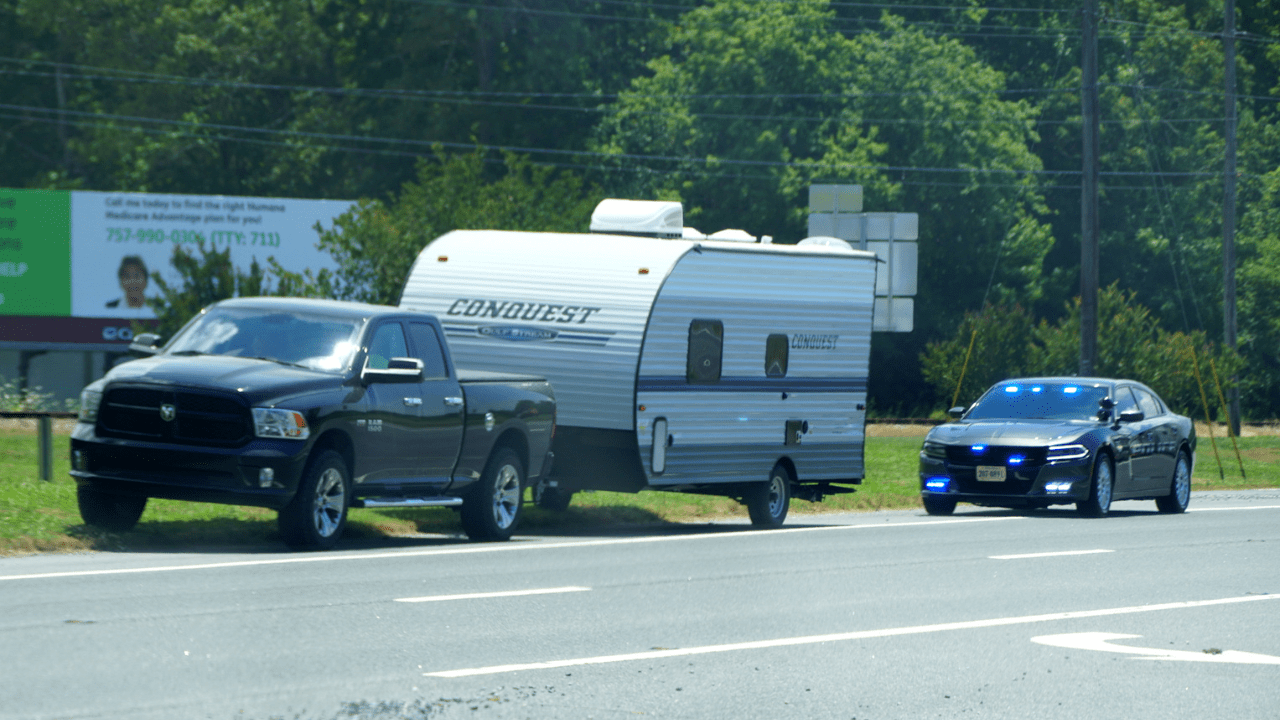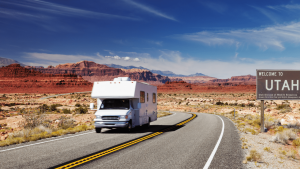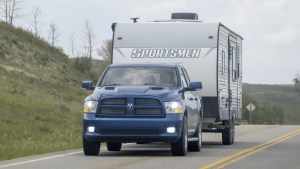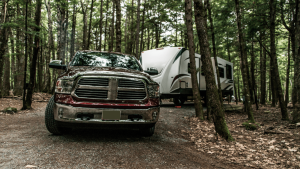RV life comes with freedom, but it also comes with rules and laws, many of which vary by state. Some are clearly marked, while others catch people off guard. And some are just common sense that RVers should know.
Either way, it’s not unusual for RVers to break the law without even knowing it, especially when moving across state lines.
Here are 15 things that are actually illegal to do in an RV, even though some travelers unknowingly do them.
1. Driving on Parkways in the Northeast
In states like New York, RVs are banned from many parkways due to low bridge clearances and weight restrictions. These roads were originally built for passenger vehicles, and some still have bridges as low as 11 feet. Unlike interstate highways, which are designed for trucks and large vehicles, parkways often have narrow lanes and limited vertical clearance.
You might not see large warning signs, but enforcement is real. Getting stuck or struck by a low overpass not only results in heavy damage but can also lead to fines and traffic violations.
2. Towing Without the Right License or Endorsement
Not every RV setup requires a special license, but some do, especially when you’re hauling a heavy fifth wheel or a long trailer. States like California, Texas, and New York have weight-based thresholds that determine what kind of license you need. In California, for example, a “Non-Commercial Class A” license is required if the total weight exceeds 10,000 pounds for a towed vehicle.
Many drivers don’t realize they’re out of compliance in their state because the rules depend not just on weight but also on how the vehicle is used. These requirements are public and can be found on most state DMV websites.
The good news is, this is very unlikely to be an issue, and even if it is, you just need to meet your state’s requirements, as reciprocity generally applies once you enter another state.
3. Ignoring RV Speed Limits
Some states post lower speed limits for vehicles towing trailers. California limits tow vehicles to 55 mph statewide, even on highways marked 65 or 70. RVers unfamiliar with the rule often drive at the regular limit, not realizing they’re breaking the law.
4. Not Wearing Seatbelts in a Moving Motorhome
Seat belt laws apply to RVs just like they do to passenger cars. In most states, the driver and front-seat passengers are required by law to wear seat belts. Some states also require all passengers, including those seated in the back, to be buckled up if the seat is equipped with a belt.
In a Class A or Class C motorhome, passengers often relax on couches or at dinettes while the RV is moving. If those seats have belts, not using them may be illegal depending on the state you’re in. Laws vary, but getting stopped or being in a crash can bring the issue to light quickly.
5. Camping in Non-Designated Areas in National Parks
National parks have strict rules about where RVs can camp or park overnight. Pullouts, trailheads, and scenic turnouts might look like good spots to stop, but many are clearly marked “No Overnight Parking.” Rangers patrol these areas regularly, especially during high season, and citations are issued when people ignore the signs.
The rules aren’t arbitrary. Many of these areas are not designed for overnight use and don’t offer proper sanitation or bear-proof trash storage. Parking there also puts extra pressure on staff and local wildlife.
6. Parking Overnight on Residential Streets
Many cities and towns have ordinances that prohibit overnight RV parking on residential streets. These rules are usually tied to zoning or local nuisance laws. Even if you’re visiting friends or family, leaving your rig on the street overnight may not be allowed.
In some areas, law enforcement may respond to complaints from neighbors, and tickets or even towing can occur. Some places allow it with a permit, but not all. The risk is higher in urban or suburban neighborhoods with limited street parking.
7. Exceeding Legal Length, Width, or Weight Limits
States have different rules for how long, wide, or heavy an RV or trailer can be. On the federal level, interstate highways generally allow up to 102 inches in width and 65 feet in combined length, but off the interstate, the limits vary. Alabama, for example, limits trailers to 40 feet, regardless of what’s legal in neighboring states.
A setup that’s fully legal in one state might not be in another. If you’re stopped for any reason or involved in a collision, being over the legal limit could affect the outcome or result in fines.
8. Driving Without Required Mud Flaps
This one often surprises people, me included. Several states, including Texas and Arizona, require mud flaps on vehicles like dually trucks and trailers when certain size or weight conditions are met. These rules are meant to reduce road spray and protect other drivers from flying debris.
Even if your home state doesn’t require them, you could still be cited while passing through a state that does. Whether or not the ticket holds up can depend on how the law is interpreted, but it’s still a risk on the road.
9. Mounting GPS Units in the Wrong Spot
Some states restrict where GPS devices and phone mounts can be placed on your windshield. The most common requirement is that they be located in the lower corners rather than in the center. The reason is that anything that blocks your direct view of the road can be considered a visual obstruction.
This law isn’t RV-specific, but it becomes more noticeable in RVs and motorhomes, which have larger windshields. You may not get pulled over just for this, but if you are stopped for something else, it can be added to the list.
10. Letting Dogs Ride Unrestrained in States That Require Restraints
Some states, especially in the Northeast, have laws that require pets to be restrained while a vehicle is in motion. This could mean a crate, a dog seat belt, or another form of secure containment. The goal is to prevent the pet from interfering with the driver or becoming a projectile in an accident.
Many RVers let their dogs roam free inside the RV or tow vehicle, not realizing they could be violating state law. Enforcement varies, but the rule exists in states like New Jersey and Rhode Island.
11. Driving with Propane On in Restricted Areas
Driving with the propane on is common among RVers who want to keep their refrigerator cold during travel. In most places, this is allowed, but some tunnels, bridges, and ferries restrict it. In those areas, signs will instruct drivers to shut off their propane tanks before entering.
This isn’t just a formality. The concern is that propane, being flammable, poses a greater risk in enclosed or high-risk environments. Ignoring posted signs can lead to fines or being turned away at the entrance.
12. Camping Without Permission on Private Land
Pulling over on what looks like unused land might seem harmless, but if it’s private property and you don’t have permission, it’s considered trespassing. Some RVers stop for a night in rural areas hoping to stay under the radar, but it’s still against the law.
Even when land isn’t fenced or posted, it can still be legally protected. If the owner notices or reports it, you may be asked to leave or face local enforcement.
13. Using the Wrong Lane While Towing
Some states restrict tow vehicles, including RVs, to specific lanes on highways. These rules are designed to keep slower or longer vehicles out of fast-moving lanes. For example, California requires tow vehicles to stay in the right lane, or the right two lanes on highways with more than four lanes.
If you’re towing and use the far left lane, you’re likely breaking the law. It may not always be enforced, but in areas with heavy traffic or patrol presence, citations are possible.
14. Ignoring the Few Remaining Nighttime Speed Limits
Most states use the same posted speed all day and night. Texas, often cited in older guides, dropped its nighttime speed differential in 2011. Today, the main exception is Montana, where selected rural highways drop by 5 mph after dark (look for signs that show “DAY 75 / NIGHT 70”). If you see a day-night sign, the lower number applies once the sun sets; failing to follow it can still draw a ticket. Outside of those limited stretches, follow the regular posted limit.
15. Dumping Waste Illegally
Dumping black water (sewage) outside of an approved dump station is illegal in every state. That part is clear and non-negotiable.
Gray water is treated the same way in most places, and the few state programs that let homeowners reuse gray water under a permit do not apply to an RV. Unless you see a posted sign that specifically authorizes gray-water discharge, treat it like black water and use a dump station.
Show sources
- New York City Department of Transportation. “Parkway Truck Restrictions.” Link. Accessed 2 Jul 2025.
- California DMV. Recreational Vehicles & Trailers Handbook – “License Classes and Requirements.” Link. Accessed 2 Jul 2025.
- Texas Department of Public Safety. “Classes of Driver Licenses (Non-CDL).” Link. Accessed 2 Jul 2025.
- New York DMV. “Driver License Class Descriptions (Form MV-500C).” Link. Accessed 2 Jul 2025.
- California Vehicle Code § 22406. Link. Accessed 2 Jul 2025.
- California Vehicle Code § 21655. Link. Accessed 2 Jul 2025.
- Texas Transportation Code § 547.606. Link. Accessed 2 Jul 2025.
- Arizona Revised Statutes § 28-958.01. Link. Accessed 2 Jul 2025.
- National Park Service, Yellowstone. “Car Camping and Overnight Vehicle Rules.” Link. Accessed 2 Jul 2025.
- California Vehicle Code § 27315. Link. Accessed 2 Jul 2025.
- Rhode Island General Laws § 31-22-28. Link. Accessed 2 Jul 2025.
- Hawaii Revised Statutes § 291C-124. Link. Accessed 2 Jul 2025.
- Chesapeake Bay Bridge Tunnel. “Regulations: Flammable Gas / LPG Limits.” Link. Accessed 2 Jul 2025.
- Maryland Transportation Authority. “Tunnel Restrictions and Vehicle Permits – Hazardous Materials.” Link. Accessed 2 Jul 2025.
- 23 C.F.R. § 658.15. Link. Accessed 2 Jul 2025.
- Alabama Administrative Code 450-3-1-.02 (4)(a). Link. Accessed 2 Jul 2025.
- California Vehicle Code § 21712. Link. Accessed 2 Jul 2025.
- Arizona Administrative Code R18-9-D701. Link. Accessed 2 Jul 2025.
- Montana Code Annotated § 61-8-303. Link. Accessed 2 Jul 2025.







Item 13 lane restrictions. I think once they start targeting the 18 wheelers who decide to pass on steep inclines at 1 MPH over the person they are passing in the restricted lane – then I will consider. We also need to get the cars that park in the left lane that are afraid of driving on hills to also be required to stay in right lane.
Right on!
I would like to know where you got the first picture in your story from? That’s our truck and camper . I couldn’t believe it when I blew the picture up and sure enough that was when we were on our way back from vacation and we were broadsided by someone who ran. I couldn’t believe it Don wearing his bright green shirt and me wearing my vest. I would love to know where the picture came from. We had to wait for another officer to come because we were just past the line from state troopers to township police.
Hopefully you guys were all OK. That photo is a stock image from Dreamstime.com